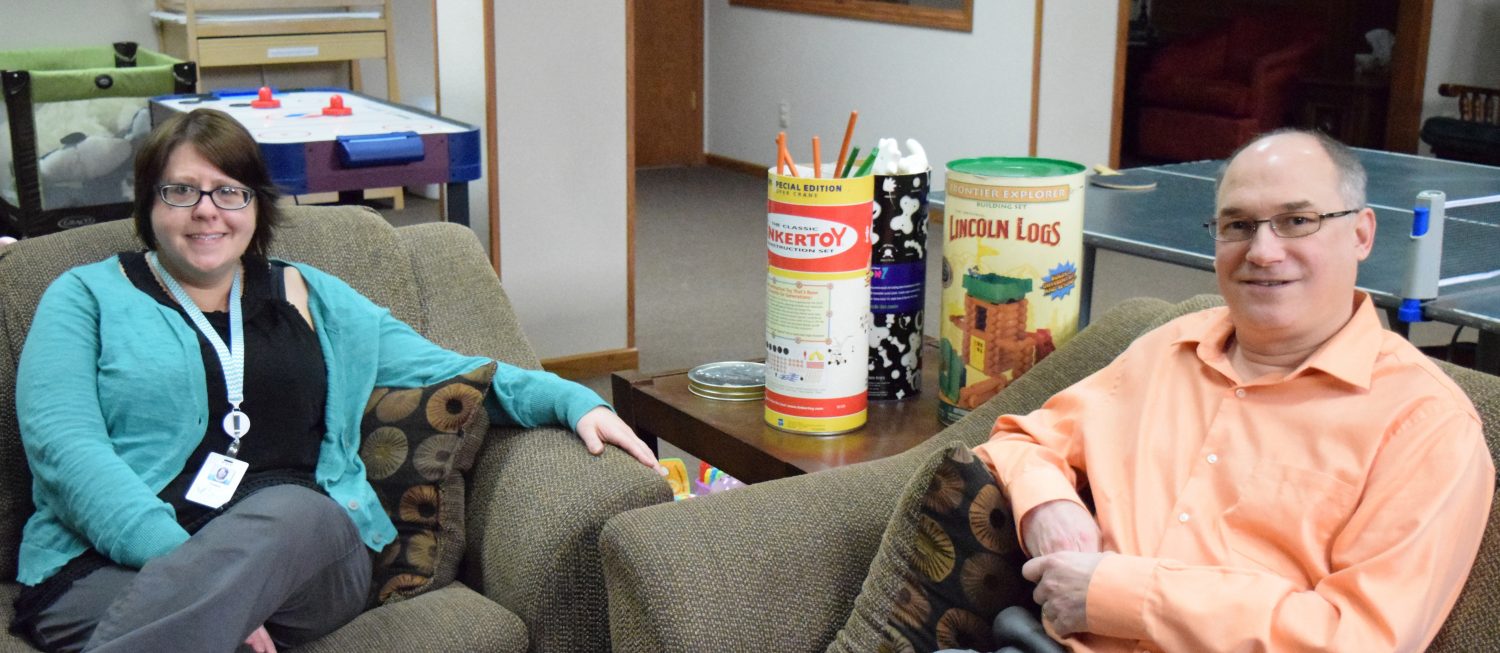PDC discusses value of supervised visitation services


Personal Development Center program coordinators Steve Fleischmann and Tressa Wasylko sit in the facility’s supervised visitation room, which is designed to provide a safe environment for parents to see their children. (Adam Hocking photo)
By Adam Hocking
Editor
MARSHFIELD — Steve Fleischmann and Tressa Wasylko provide a service to families, allowing parents who might not otherwise have an opportunity to see their children to do so in a supervised environment. Fleischmann and Wasylko are program coordinators for Personal Development Center’s (PDC) family visitation center.
PDC is nonprofit that helps victims of domestic violence by connecting them with the resources they need. May is Supervised Visitation Awareness Month, and the PDC is looking to highlight the services it provides locally.
Supervised visitations are generally for families where parents may be divorced and cannot amicably see their child together or there may be issues such as substance abuse, mental illness, domestic violence incidents, or legal mandates that visitations be supervised. PDC steps in to allow parents without custody to see their children.
PDC has a special room for the visitations, which is secured with cameras and doors that can only be unlocked by staff. Aside from the security measures, the room has the look of an open family space. There are chairs, a couch, and many toys for children, including pingpong and air hockey tables. Visitations last “up to two hours” Wasylko said, and PDC will stretch the visit to three hours if the parent travels a long distance to see the child.
Wasylko and Fleischmann monitor the visits in the room, but their level of involvement with the parents and children varies depending on family circumstances. If, for instance, a parent has not seen his or her child for a long duration, Wasylko and Fleischmann may facilitate by helping the parent and child connect.
“Ideally, it would be up to them (the parents) to kind of do things and us just be here to supervise and really just listen and watch to make sure it’s safe interaction,” Wasylko said. “We don’t want to be invasive to them. We want them to be able to spend quality time with their child.”
However, there are occasions when Wasylko or Fleischmann will have to intervene or cut a visit short if the parent displays inappropriate behavior. In some cases only one coordinator will supervise the visit, and sometimes two will be in the room if the parent has behaviors that could be potentially dangerous. There is also a panic button that, when pressed, alerts law enforcement, though Fleischmann said he has “never had to use it.”
If the child is being exchanged from one parent to the other during the visit, one parent is asked to enter the building from the back and the other from the front so that they do not have to interact with each other in case their relationship is such that it could be detrimental for the child to witness and to ensure safety.
The attitude parents bring into the supervised visitation is important, as some come in thinking, “Oh, you’re going to be against us. You’re going to make me do this. It’s all controlled,” Fleischmann said. Some parents — for example those that require supervision due to a past history of domestic violence — may be hesitant to partake in supervised visitations because they feel they will be judged.
“We want to let everybody know that, that’s not what we’re about here. We’re a neutral party,” Fleischmann said. “Usually we’ve come to find that once they get here, once they realize what we’re doing here, they come to appreciate what we’re doing.”
Wasylko said the supervised visitation service not only allows parents to see their children but also ensure the safety and best interests of children.
“It’s a way to keep the children out of the middle and, hopefully, free of any adult issues that they really shouldn’t have to deal with,” Wasylko said.
For more information on the Personal Development Center, visit pdcmarshfield.com.
Leave a reply
You must be logged in to post a comment.






